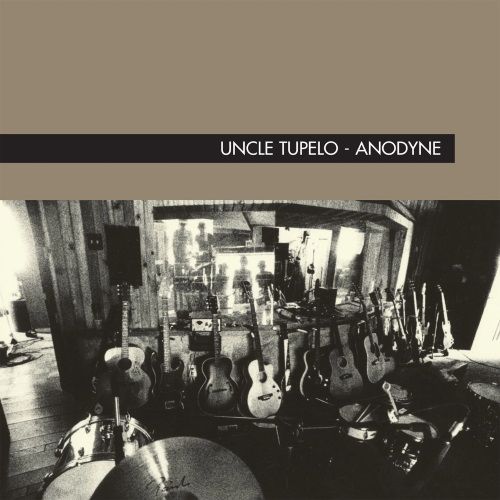The members of Uncle Tupelo didn't know that Anodyne would prove to be their final album nor could they have known that history would look so favorably upon it. Nearly 10 years after its release in October of 1993, history regards The Tupes as pioneers of the alt.country movement and Anodyne as their finest hour. For those of you unfamiliar with the alt.country movement, a word of explanation is in order.
Like any genre in music, alternative country is fairly nebulous. It probably started sometime in the late 80's and, in general, encompasses artists who blend rock with country and/or American folk music as well as musicians who play something more akin to "traditional" country as opposed to the overly polished suburban-infused music that emanates from Nashville these days. Even No Depression, a magazine dedicated to the alt.country movement has the byline, "The Alternative Country (Whatever That Is) Bimonthly." “No Depression” is also another name for the alternative country movement and takes its name from Uncle Tupelo's first album of the same name which, in turn, was derived from the song of the same name by the Carter Family which appears on said album. Whew!
The Tupes, as they are fondly referred to, began in 1987 in Belleville, IL and consisted of Jay Farrar (guitar, vocals), Jeff Tweedy (bass, vocals), and Mike Heidhorn (drums). No Depression appeared in 1990 and was a blistering mix of punk and country. Their second album, Still Feel Gone, was released the following year. Relentless gigging and great songs garnered them critical praise and a dedicated following. 1992 saw the release of March 16-20, 1992. Produced by REM's Peter Buck, it was nearly bereft of overdubs with hardly a trace of electric instrumentation. It’s blend of original material and covers of traditional American folk songs proved successful and the band were signed by a major label, Sire. After March 16-20, 1992, Heidorn left the band and was replaced by Ken Coomer. Desiring to avoid overdubs again, they brought John Stirrat in on bass as well as multi-instrumentalist Max Johnston. In the spring of 1993 they retired to a recording studio in Austin, TX.
For Anodyne, The Replacements and The Misfits were replaced as touchstones by Neil Young and Creedence Clearwater Revival. This is not to say that there's no high-powered electric guitar to be found, just merely that slashing chords became transformed into melodic washes of fuzz. But, perhaps in a nod to March 16-22, 1992, the album begins with a couple acoustic numbers.
"Slate" lazily starts the proceedings with a plaintive guitar and mournful fiddle. Sung by Farrar, it's about loneliness ("can't find you now/didn't know you then") and it sets the tone for the rest of his contributions to the album. Tweedy's paean to healing power of music, "Acuff-Rose," follows. It's a sprightly tune with some manic mandolin and its lyrics stand in contrast to those of the preceding song: “Sometimes I get the feeling/that everything’s OK.”
The album counterpoints Farrar's intimate doses of melancholy with more hopeful slices of life from Tweedy, even if they are bittersweet.
In Farrar's fiery "Chickamauga" (named after the site of a Civil War battle), a bit of the old punk spirit shines through as the narrator waxes angrily over the end of a relationship. Lloyd Maines' pedal steel guitar underpins Farrar's pleas for an end to the pain in "Anodyne", but his playing also gives "No Sense in Lovin'" a playful feel in contrast to the lyrics. Tweedy covers the parting of lovers in "The Long Cut" but gives a hint of reconciliation: "If you wanna take the long cut/we'll get there eventually." Texan Doug Sahm joins the band in a cover of his "Give Back the Keys to My Heart." However, the Tex-Mex lilt is stripped leaving a stark plea, full of regret and remorse.
Every song here has a great melody and the playing is fantastic throughout. Lyrically, the band moved away from chronicling working-class/small town existence towards more universal themes. And they did so very well. Tweedy's take on the band's course in the music business wallows in irony while the insistent dobro of "Fifteen Keys" sits well beside a clutch of sibilant metaphors. Anodyne was surely the band's most mature album - too bad it was their last.
Rhino re-released Anodyne earlier this year remastered and with bonus tracks. The sound is crisper giving the performances an even greater intimacy. Of the five bonus tracks, two were previously unreleased. "Stay True" is a blistering rocker very much in the spirit of their first two albums. The dirge-like "Wherever" has an aching fiddle bolstering the sad imagery of watching a lover depart. A cover of Waylon Jennings' "Are You Sure Hand Done It This Way?" features Texan Joe Ely and remains a timely message to the Nashville establishment. Two live cuts from a promotional EP round out the CD. Terry Fell's "Truck Drivin' Man" is played as if fueled by amphetamines. It hardly seems that Johnston could play the fiddle any faster. Finally we have a great cover of the Dale Hawkins rockabilly classic "Suzy Q," which was also done by CCR. Laced with feedback and an infectious groove, it ends the album on a raucous, fun note.
(This was originally published at The Green Man Review back in 2003-08.)

No comments:
Post a Comment